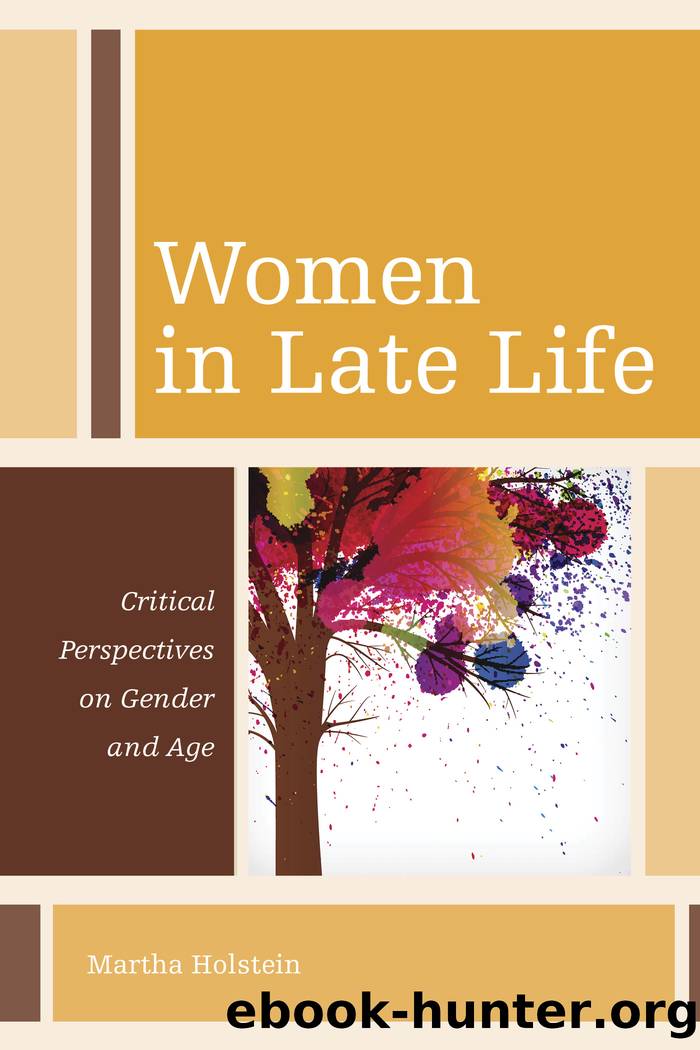Women in Late Life by Holstein Martha;

Author:Holstein, Martha;
Language: eng
Format: epub
Tags: undefined
Publisher: Rowman & Littlefield Publishers
Published: 2012-01-15T00:00:00+00:00
Essentialist Ideas about Women and
the Matter of Choice
The continued evocation of essentialist ideas about gender and the assumption that caregiving is freely chosen buttress the private nature of care. Women are naturally more adept at giving care than men, or so go the claims, and, moreover, they freely choose to play this role. âA good woman,â observes feminist sociologist Cecilia Ridgeway (2011), âshould be, as a deep moral obligation, intensively committed to her family and this commitment should take precedence over all othersâ (129). All the âinformalâ caregiving in this countryânow estimated to be worth $450 billion each year (Feinberg et al. 2011) and still primarily done by womenâseems to support both claims. In a country where choice is central to our understandings of autonomy and where obligations are all putatively chosen ones, it is not a stretch to assume that the act of caregiving itself becomes proof of choice. To observers, the sheer number of hours family members devote to caregiving (Feinberg et al. 2011; MetLife 2011) serves as evidence that they have voluntarily adopted this role. In one sense, they have chosen the role, but how real is the choice when desirable alternatives are absent?
This assumption negates the fact that many of our obligations are unchosen. âChoiceâ may also reflect oneâs class position, the persistence of gender expectations, and the fact that there really are no choices for many women except abandonment, which is hardly a choice. Women become caregivers for multiple reasons, especially love, but to suggest that they actively chose the role is to assume that they have good alternatives from which to choose, a fundamental requirement for autonomous action. Those alternatives do not exist. Often the task is thrust upon them by circumstances they do not control. Think of this situation: Jane and her mother, Grace, have a warm and loving relationship. Grace, who is eighty-two, has emphysema and osteoarthritis. She has trouble getting around, bathing, dressing, and preparing meals. She lives on her $1,500 monthly Social Security check and the modest assets that she and her late husband saved; she lives in her own home and wants to stay there. Jane lives twenty miles away and supports her motherâs wish to stay at home, but she also has a job, which does not give her any flexibility in her working hours, which she needs to help support her family that includes two teenage sons. Grace does not qualify for public assistance and can pay for only occasional assistance from a paid home care aide. Jane honors all that her mother has done for her over the years and wants to do what she can to make Graceâs life easier. Given the familyâs financial constraints, the only option she sees is for her to do whatever her mother needs to have done. She steps into the breach because she loves Grace, because she knows it is expected of her, and because there is no other way for Grace to get the daily help that she needs.
Download
This site does not store any files on its server. We only index and link to content provided by other sites. Please contact the content providers to delete copyright contents if any and email us, we'll remove relevant links or contents immediately.
Cecilia; Or, Memoirs of an Heiress — Volume 1 by Fanny Burney(32018)
Cecilia; Or, Memoirs of an Heiress — Volume 3 by Fanny Burney(31434)
Cecilia; Or, Memoirs of an Heiress — Volume 2 by Fanny Burney(31378)
The Great Music City by Andrea Baker(30630)
We're Going to Need More Wine by Gabrielle Union(18599)
All the Missing Girls by Megan Miranda(14560)
Pimp by Iceberg Slim(13703)
Bombshells: Glamour Girls of a Lifetime by Sullivan Steve(13661)
Fifty Shades Freed by E L James(12883)
Talking to Strangers by Malcolm Gladwell(12805)
Norse Mythology by Gaiman Neil(12774)
For the Love of Europe by Rick Steves(11327)
Crazy Rich Asians by Kevin Kwan(8858)
Mindhunter: Inside the FBI's Elite Serial Crime Unit by John E. Douglas & Mark Olshaker(8662)
The Lost Art of Listening by Michael P. Nichols(7116)
Enlightenment Now: The Case for Reason, Science, Humanism, and Progress by Steven Pinker(6851)
The Four Agreements by Don Miguel Ruiz(6278)
Bad Blood by John Carreyrou(6251)
Weapons of Math Destruction by Cathy O'Neil(5795)
